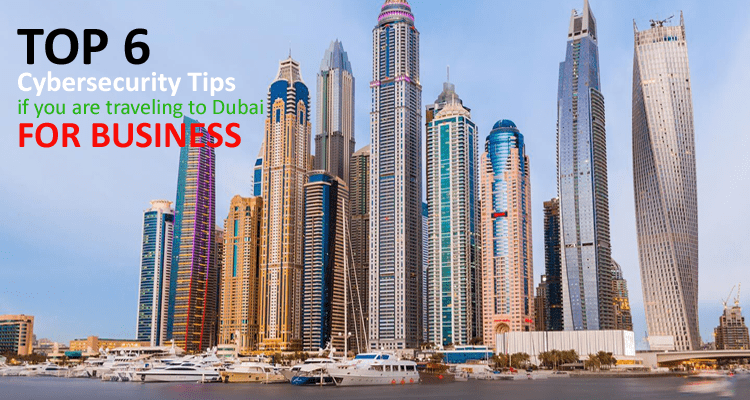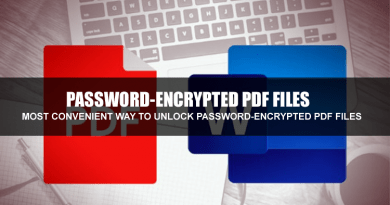6 Cybersecurity Tips if You are Traveling to Dubai for Business
Planning a business trip abroad and need to know how to stay safe? How about ways to protect confidential data from prying eyes? Those who travel for business always have important information stored on their devices. Technology has made it easy to take business along for the flight, but keeping that data safe is a challenge. Here are some cybersecurity tips to go through before taking off.
The Middle East is just like Western countries in many ways. But they do have a few rules and regulations around technology that differ from the West. Those who plan on visiting Dubai or any other city in the United Arab Emirates should do some research before going.
Different rules aren’t the only things to look out for when visiting a foreign country. There are dangers involved in bringing devices like mobile phones and laptops along, regardless of the destination.
Also Read: A Brief Overview of Cybersecurity Laws in UAE
Why Cybersecurity is Important for Travelers?
Because cybercriminals often focus on tourists and those who travel for business. Tourists make for easy targets, and business people carry enticing information around with them. This isn’t a new thing either. Hackers have been targeting business travelers for a very long time now.
Also Read: Top 10 Best Recruitment Companies in Dubai
Cybersecurity Tips for Business Travelers
Anyone traveling abroad, regardless of the reason, will want to protect their devices. So have a look at these cybersecurity tips for the traveler who doesn’t want their data compromised.
Here are we presenting six Cybersecurity Tips for the Vigilant Business Traveler.
1. Install an Antivirus and Firewall
Almost everyone knows how important it is to have security software installed on a device. Yet, somehow, plenty of folks still don’t use antivirus programs.
Some devices, like those that come with Windows 10, already have antivirus software pre-installed. This is handy, but a device with access to business accounts might need a better antivirus program. It’s important to discuss this with the IT department or security personnel before leaving.
2. Connect to a Secure Network
Public WiFi is extremely popular among business travelers thanks to how convenient it’s become to find and connect to. Most hotels, coffee shops, restaurants, malls, and even a few parks offer free WiFi connections.
Hackers know this too, of course, and love to target these types of connections. Mainly, because public WiFi connections are notoriously dangerous and easy to duplicate. So hackers create their own fake WiFi hotspots or hack into existing ones and infect anyone who connects.
Avoid unencrypted WiFi networks. Rather create a secure hotspot using a mobile connection or ask the hotel about their WiFi security protocols.
Also Read: 10 Reasons to Invest in Dubai Real Estate
3. Be Careful With Social Media
It’s no secret that people love to share their adventures abroad on social media. But this can land someone in hot water in a foreign country if they’re not careful. People unknowingly become targets when they share their current locations or itinerary online because anyone can see it.
Cybercriminals do keep track of people’s movements so they can target their internet connections or the devices themselves in real life. From overlooking laptop screens to trying to insert a USB when the person isn’t looking. It has happened before, and it can happen again.
4. Use a Secure Browser
There is some debate about what is the most secure browser. Microsoft Edge has actually gained some traction in this area, right after Google Chrome. In general, most cybersecurity experts agree, however, that the TOR browser still comes out on top. While Edge and Chrome offer secure connections, they fall far behind TOR in terms of privacy and IP protection.
This means that third-parties and the websites people visit through TOR will have a hard time tracking the user. Thanks to this browser’s superior encryption methods, it’s currently one of the safest browsers out there. Plus it’s free to use. The only downside here is that it is a little more complicated to use than most other browsers.
Also Read: Buying Gold in Dubai: Top 10 Tips to Buy Gold in Dubai
5. Keep Devices Locked Up and Locked Away
The safest way to deny anyone access to sensitive data is to not use devices at all while traveling. This isn’t always possible, of course, especially on a business trip. So make sure that all devices are password-protected and locked away when not in use. Most hotels have electronic safes where laptops or tablets can be stored.
6. Store Sensitive Data on the Cloud
A good way to make sure that data stays secure even if the device becomes compromised is the cloud. Back up all relevant information to a secure cloud server and delete it off of the device before leaving. Then simply work with the documents stored on the cloud until the end of the trip.
Also Read: 14 Best Smart Gadgets & Devices for your Smart Homes
In Conclusion
Business trips can be stressful but don’t add to that stress by becoming an easy target for cybercriminals. Follow the rules of cybersecurity etiquette and make that Dubai trip unforgettable in other ways.






